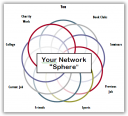I thought I’d share with all of you the RSS feed tool I’ve been using for my RSS feeds, and why I like it so much. Dubbed Feedburner, I’ve been really impressed with the many uses of this free service. While sometimes some “free” tools can be a bit wonky, I’d rank this one right up there with Google Analytics and the free 4Q website survey by Avinash Kaushik and iPerceptions.
Feedburner is structured into five buckets that you can play with after you set up your feed, which doesn’t take any time at all. You don’t have to use them, but they are there if you want to take advantage of this tool.
Analyze your RSS Feeds
The Analyze tab gives you anonymous data, showing you how many subscribers you have and what they are viewing/clicking through on. It does give you a pie chart so you know which feed service your subscribers are using. This is a nice feature that gives you anonymous info so you can either test placement of your feed, ensure that it’s working on the different services your subscribers are using, and also see which articles are of interest. The click-throughs are similar to a stat I would get from Google Analytics and help me determine what kinds of content I should focus on to ensure that I’m providing something that’s helpful to my audience. I could very well be over-thinking that aspect of the data, but right now it’s what I’m using it for.
Optimize your RSS Feeds
Under the Optimize tab, you have at least 10 different options to choose from. From ensuring your feed is compatible with a maximum number of services to enabling feeds for podcasting from your blog service, there are quite a few items you can take advantage of. I haven’t used them yet, but there are new services called “Feed Accessories” that might warrant being explored. You can share photos, social bookmarking links and your physical location with some of the feed accessories. I’ve used this tab primarily to ensure that the feed works in multiple formats; haven’t dug much deeper than that.
Read More…


 After Friday’s Amazon fiasco, where myself and several other writers, publishers, and editors called out to the blogosphere, I realized that many folk probably are feeling a little devastated right now. Just asking
After Friday’s Amazon fiasco, where myself and several other writers, publishers, and editors called out to the blogosphere, I realized that many folk probably are feeling a little devastated right now. Just asking